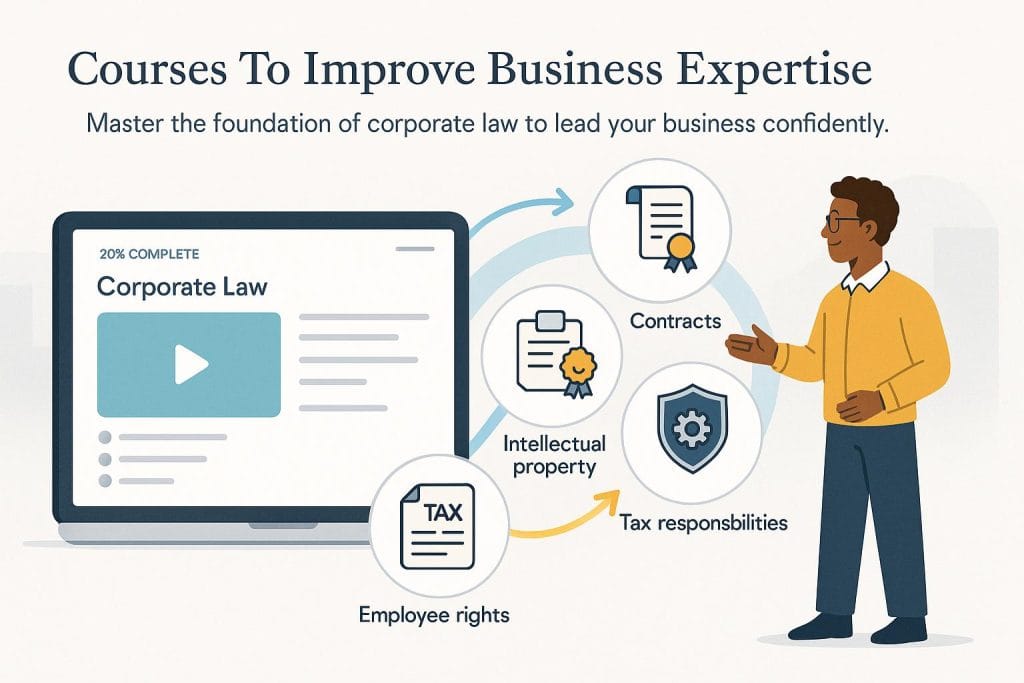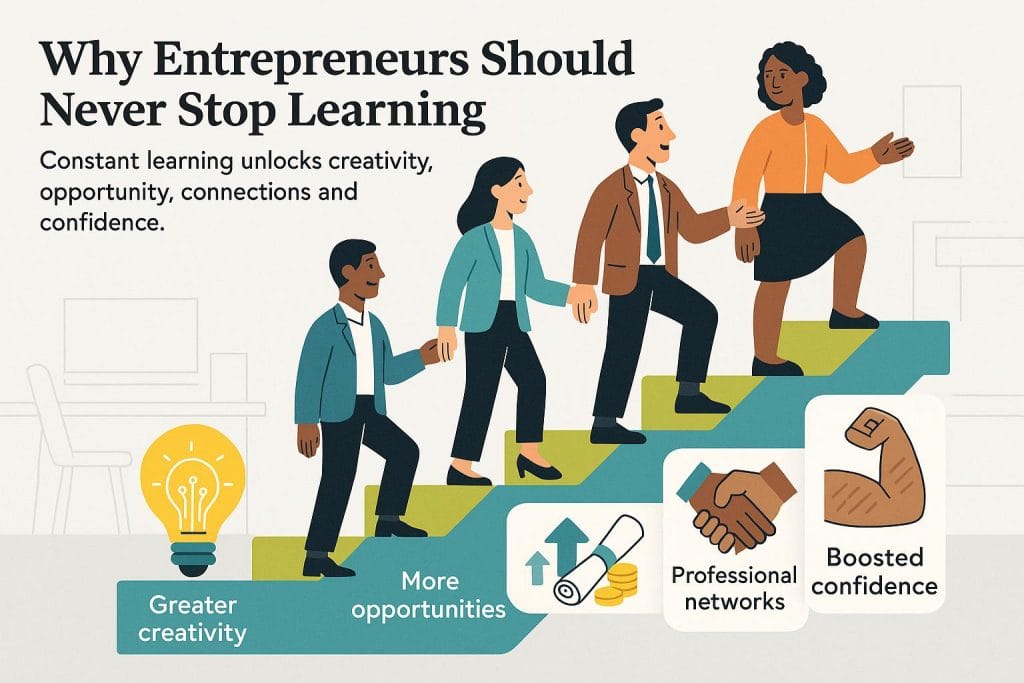The drive to keep learning can come from many places. Maybe you’re tackling a new business challenge, or you’ve realized there’s a skill you’d like to strengthen. However it starts, taking that first step toward professional growth by exploring courses for business is what helps you become a stronger business owner.
Whether you’re just starting out or have been running your company for years, here are 11 types of business-related courses that can expand your expertise and help you prepare for the future.
Courses to improve business expertise
1. Corporate law
Understanding the laws and regulations around forming, owning and managing a company is essential for any business owner. Corporate law courses give entrepreneurs a clear foundation for navigating today’s complex regulatory landscape.
These classes cover core legal concepts like business formation, franchising and entrepreneurial ventures. You’ll also explore topics such as contract negotiations, intellectual property, employment and anti-discrimination laws, and new regulations shaping modern businesses.
A corporate law course can help you understand what to consider if you're thinking about
quitting your day job to launch your own business.
2. Corporate finance techniques
Corporate finance covers the financial activities that keep a business running smoothly. The goal is simple: maximize earnings, achieve profitable growth and build long-term value. Finance courses for business owners dive into key areas like financial modeling, capital structure, risk management and smart investment decisions.
These classes can also show you how to read profit and loss statements and other financial reports, plan budgets and build strategies for steady funding. They often include hands-on practice so you can apply what you learn to real business situations. The goal is to leave with tools you can use right away to make smart financial decisions and keep your company growing.
3. Goal setting
Clear, realistic business goals are the backbone of any successful operation. Maybe you want to increase sales, move into a new market or launch a new product. No matter the objective, having a clear target makes it easier to stay focused and measure progress.
Goal-setting courses can show you how to set achievable objectives, reassess them as your business evolves, and avoid the common pitfalls that make goals hard to reach. These classes give you practical tools to turn big ideas into step-by-step plans you can actually follow.
4. Speaker training
One of the most powerful soft skills in business is knowing how to speak with confidence to employees, clients, partners and the public. Strong speaking skills can set you apart when pitching investors, leading team meetings or negotiating deals. Communication courses are a great way to help business leaders build an executive presence and deliver messages that persuade and inspire.
Modern public-speaking courses often focus on strategies like handling presentation anxiety, using storytelling to hold attention, and adapting your style for different audiences. And the demand is growing: LinkedIn’s 2024 Workplace Learning Report found that presentation skills jumped by 64 percent as a priority for employers, showing how critical clear communication has become for career growth.
Every business leader should be ready to deliver
key presentation types, including investor pitches, board updates, vision speeches, new product announcements and thought leadership keynotes.
5. Interactive whiteboarding
Interactive whiteboarding has moved far beyond sticky notes and markers. Today’s digital tools let teams brainstorm, plan and problem-solve together in real time, no matter where they’re located.
Business courses now show leaders how to use platforms like Miro, Mural and Microsoft Whiteboard to keep hybrid and online meetings organized, collaborative and engaging. These tools make it easy to capture ideas, update plans in the cloud and ensure everyone stays on the same page.
6. Press opportunities
Getting media coverage can be a game-changer for new and growing businesses. Entrepreneurs can raise their venture’s profile by partnering with bigger brands, pitching stories to publications, or hosting creative contests. But first, they need to learn how.
Modern press strategy courses focus on digital-first tactics like pitching yourself as a business podcast guest, building thought leadership on LinkedIn and using timely “newsjacking” techniques to join industry conversations. These classes also help founders shape compelling, data-driven stories that grab a journalist’s attention and build lasting credibility.
7. Global expansion
Fast-growing companies often view international market expansion as the next stage of their business plan. In fact, a 2025 Censuswide survey of 2,000 senior leaders for Phrase found that 90 percent of businesses plan to enter new international markets with different languages within the next five years, but nearly two-thirds said identifying and entering those markets is a major challenge.
International business courses address these hurdles by covering topics like supply chain resilience, cross-cultural negotiation, international business etiquette and regulatory compliance across multiple jurisdictions. They give leaders strategies to reduce risks, adapt to new cultures, and build confidence when expanding across borders.
8. Employee psychology
Understanding what drives employees has become essential as companies manage hybrid work, a multigenerational workforce and shifting expectations. Courses in employee psychology explore how people think and act at work and help leaders use that knowledge to build stronger teams.
These classes often cover motivation theory, behavioral economics and organizational culture. You’ll also find lessons on leadership psychology, hiring and training practices, communication styles, workplace conflict resolution and negotiation. Some programs even dive into the psychology of entrepreneurship, helping business owners understand the link between human behavior and business success and how different entrepreneurial and leadership styles, from innovators to opportunists, shape outcomes.
9. Strategies for exiting bad partnerships
When a business partnership stops working, ending it can be tricky. The goal is to protect your company while also preserving your reputation and relationships. Courses on partnership dissolution give business owners structured ways to plan an exit, including how to value the business, negotiate terms and handle disputes fairly.
These programs also cover practical areas of dissolving partnership agreements, like managing intellectual property transfers, setting up earnout provisions and keeping operations steady during the transition.
A failed partnership isn't always the end. In fact, many entrepreneurs see it as an opportunity to
rebrand the business, make changes and set the stage for future success.
10. Video creation and editing
Video has become an essential element of business marketing that attracts consumer attention and interest. According to Wyzowl’s 2025 Video Marketing Survey, 89 percent of businesses now use video as a marketing tool, and 95 percent consider it important to their overall digital marketing strategy. In other words, learning video skills today is a no-brainer for entrepreneurs.
Course options in this area range from beginner classes on video strategy to advanced training on editing, vertical video formats, and creating interactive content that boosts engagement.
11. Influencer marketing
Influencer marketing helps businesses reach customers through creators people already follow and trust. More brands are shifting away from celebrity endorsements and turning to nano- and micro-influencers, who often see higher engagement and closer relationships with their audiences.
According to Aspire’s State of Influencer Marketing 2025 report, the industry is projected to reach $47.8 billion by 2027, with 71 percent of marketers planning to increase their influencer marketing budgets this year. Nano-influencers (2.5K-25K followers) currently drive average engagement rates of over 7 percent, significantly higher than macro accounts.
Modern courses on influencer strategy now go beyond brand awareness, teaching entrepreneurs how to measure digital marketing ROI, navigate FTC compliance, and build long-term, authentic partnerships that resonate with audiences.
Influencer marketing keeps growing as more people become
content influencers, agencies expand their reach, and new formats create endless opportunities to connect.








